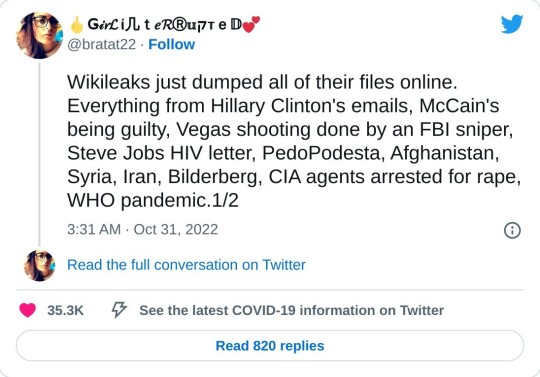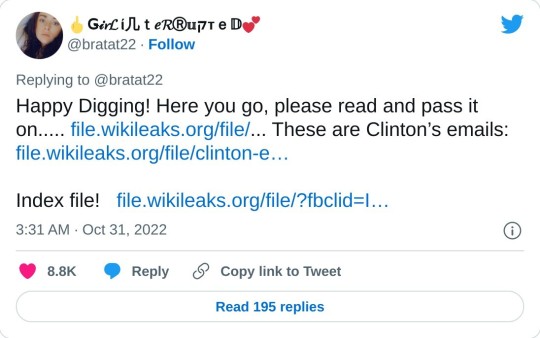#hillary's emails
Text
Last night I read something shortly after taking my pills and right before going to bed. Today I was going to tell my mom the piece of news I read but I stopped myself and went “no wait. There’s no way he actually said that. I must have read that from a satire Twitter account or something.” So I looked it up and
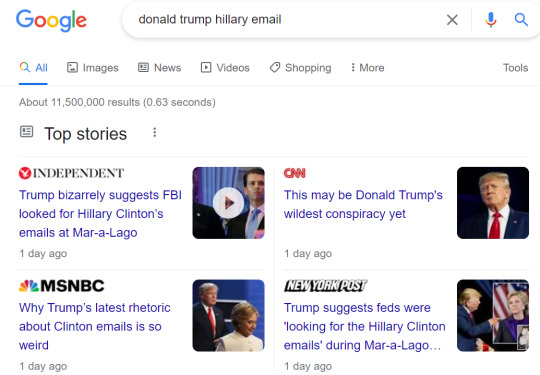
Trump actually said that the FBI were looking for Hillary’s emails in Mar-A-Lago.
The emails that people keep saying she deleted. (As if there aren’t ways to get them back.) That he would have printed copies of for some reason.
24 notes
·
View notes
Text
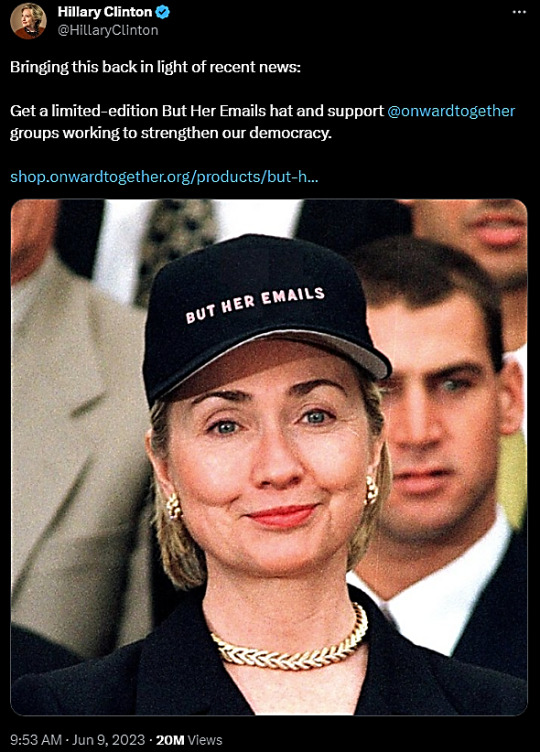
It took a while...
but Hillary must be ecstatic that karma
finally came for Trump.😁
108 notes
·
View notes
Text
Mike Luckovich for June 13, 2023

#editorial cartoons#mike luckovich#young frankenstein#gop#gene wilder#igor#eye gore#marty feldman#tRUmp#monster#hillary#but her emails#cartoons#political cartoon
43 notes
·
View notes
Text
It’s hard to find anyone these days who looks back on the U.S.-led response to the January 12, 2010, Haiti earthquake as a success, but it wasn’t always that way. Right after the disaster, even as neighborhoods lay in rubble, their people sweltering under tarps, the consensus—outside Haiti—was that America’s “compassionate invasion” (as TIME Magazine called it) had been “largely a success” (Los Angeles Times), offering further proof that “in critical moments of the history of mankind … the United States is, in fact, the indispensable nation” (Expresso, Portugal).
As the latest release of Hillary Clinton’s personal emails by the U.S. State Department Monday revealed, that perception was not an accident. “We waged a very successful campaign against the negative stories concerning our involvement in Haiti,” Judith McHale, the under-secretary of state for public diplomacy and public affairs, wrote on February 26, 2010. A few weeks before, the public affairs chief had emailed newspaper quotations praising U.S. efforts in Haiti to Secretary Clinton with the note “Our Posts at work.” Clinton applauded. “That’s the result of your leadership and a new model of engagement w our own people,” she replied. “Onward!”
But one person even closer to the secretary of state was singing a different tune—very, very quietly. On February 22, after a four-day visit to the quake zone, Chelsea Clinton authored a seven-page memo which she addressed to “Dad, Mom,” and copied their chief aides. That informal report tells a continuing story of the unique brands of power and intelligence wielded by the Clinton family in Haiti and around the world—and of the uniquely Clinton ways they often undermine themselves.
First off, there was the secrecy. The memo—by a Clinton, with a master’s in public health from Columbia University, pursuing a doctorate in international relations from Oxford and with a prominent role at her family’s foundation—would have obliterated the public narrative of helpful outsiders saving grateful earthquake survivors that her mother’s State Department was working so hard to promote. Instead, like so much of the inner workings of the Clintons’ vast network, it was kept secret, released only in an ongoing dump of some 35,000 emails from Hillary’s private server, in response to a Freedom of Information Act Lawsuit wrapped up in the politics of the 2016 presidential election.
Chelsea Clinton was blunt in her report, confident the recipients would respect her request in the memo’s introduction to remain an “invisible soldier.” She had first come to the quake zone six days after the disaster with her father and then-fiancé, Mark Mezvinsky. Now she was returning with the medical aid group Partners in Health, whose co-founder, Dr. Paul Farmer, was her father’s deputy in his Office of the UN Special Envoy for Haiti. What she saw profoundly disturbed her.
Five weeks after the earthquake, international responders were still in relief mode: U.S. soldiers roamed Port-au-Prince streets on alert for signs of social breakdown, while aid groups held daily coordination meetings inside a heavily guarded UN compound ordinary Haitian couldn’t enter. But Haitians had long since moved on into their own recovery mode, many in displacement camps they had set up themselves, as responders who rarely even spoke the language, Kreyòl, worked around them, oblivious to their efforts.
“The incompetence is mind numbing,” she told her parents. “The UN people I encountered were frequently out of touch … anachronistic in their thinking at best and arrogant and incompetent at worst.” “There is NO accountability in the UN system or international humanitarian system.” The weak Haitian government, which had lost buildings and staff in the disaster, had something of a plan, she noted. Yet because it had failed to articulate its wishes quickly enough, foreigners rushed forward with a “proliferation of ad hoc efforts by the UN and INGOs [international nongovernmental organizations] to ‘help,’ some of which have helped … some of which have hurt … and some which have not happened at all.”
The former first daughter recognized something that scores of other foreigners had missed: that Haitians were not just sitting around waiting for others to do the work. “Haitians in the settlements are very much organizing themselves … Fairly nuanced settlement governance structures have already developed,” she wrote, giving the example of camp home to 40,000 displaced quake survivors who had established a governing committee and a series of sub-committees overseeing security, sanitation, women’s needs and other issues.
“They wanted to help themselves, and they wanted reliability and accountability from their partners,” Chelsea Clinton wrote. But that help was not coming. The aid groups had ignored requests for T-shirts, flashlights and pay for the security committee, and the U.S. military had apparently passed on the committee’s back-up plan that they provide security themselves. “The settlements’ governing bodies—as they shared with me—are beginning to experience UN/INGO fatigue given how often they articulate their needs, willingness to work—and how little is coming their way.”
That analysis went beyond what some observers have taken years to understand, and many others still haven’t: that disaster survivors are best positioned to take charge of their own recovery, yet often get pushed aside by outside authorities who think, wrongly, that they know better. Her report also had more than an echo of the philosophy of her Partners in Health tour guides. More than five years later, her candor and force of insight impress experts. “I am struck by the direct tone and the level of detail,” says Vijaya Ramachandran, a senior fellow at the Center for Global Development.
But then came the recommendations—and a second classic pitfall. Far from speaking uncomfortable truths to her parents’ power, Chelsea was largely agreeing with their own assessments. At a March UN donors’ conference for Haiti over which Bill and Hillary Clinton presided, the secretary of state would tell the assembled delegates that the global community had to start doing things differently. “It will be tempting to fall back on old habits—to work around the [Haitian] government rather than to work with them as partners, to fund a scattered array of well-meaning projects rather than making the deeper, long-term investments that Haiti needs now,” she said, nearly repeating her daughter’s dismissal of the “ad hoc efforts” that had defined the early response.
Bill Clinton had also long been scathing in his assessments of aid work there. As the Associated Press correspondent in Port-au-Prince before, during and after the quake, I’d followed him on his visits since becoming UN Special Envoy in mid-2009. In public, the former president called for better coordination between NGOs and donors. In private, after long, frustrating days in the Caribbean heat, he’d sometimes just go off, lighting into the nearest staffer about partners’ missed meetings and broken promises. The former president also loved to apologize for his own past actions—destructive food policies which flooded the Haitian market with cheap Arkansas rice, and ordering a crippling embargo that destroyed the Haitian economy during the reign of a 1990s military junta (some of whose members had been on the CIA payroll).
Yet those introspections rarely extend to the present. As anyone who’s covered the Clintons can tell you, they armor themselves with staffers who hit back against almost any hint of criticism—especially when an election is near. The one thing the Clintons never seem to question is the idea that they, personally, should remain in charge. And that is precisely what Chelsea recommended in her report:
“The Office of Special Envoy—i.e., you Dad—needs authority over the UN and all its myriad parts—which I do believe would give you effective authority over [the NGOs].” Her father, the former president, should be a “single point of authority,” she said—overseeing a replacement for the organizational system of government agencies, militaries and NGOs.
The truth is that Bill Clinton was already by far the most powerful individual in this flawed system, with Hillary close behind. She was guiding the U.S. response as secretary of state. He was already UN Secretary-General Ban Ki-moon’s Special Envoy for Haiti, head patron of the Clinton Foundation and co-leader of the newly formed Clinton-Bush Haiti Fund. Weeks later the couple would share the dais at the donors conference, where governments and aid groups pledged some $10 billion for Haiti’s recovery. Her father would soon accept the co-chairmanship of the Interim Haiti Recovery Commission, the quasi-government body charged with allocating many of the funds. (“Finally,” chief of staff Cheryl Mills wrote to the secretary in a March 29, 2010, email, when news of the appointment leaked to the Haitian press.)
The irony is that, after pages of scathing analysis about the failure of international responders to understand and respect ordinary people in Haiti, Chelsea Clinton’s plan would have created an even more powerful foreigner operating at an even greater remove. She did call on this new Super Clinton-led structure to “support the Haitian government,” but noted that it could only build “local capacity and capabilities, where feasible”—a logical loophole the U.S. government would fall back on time and again as it kept to old habits after all, including refusing to provide Haiti’s government with direct budget support.
As it was, that personality-driven leadership style meant the response to the Haiti quake would focus on priorities set by those surrounding them, rather than those of majority of Haitians. The new email tranche shows how quickly the construction of low-wage garment factories and prioritizing exports to the U.S. market came to the center of the U.S.-led response in Haiti. That strategy, authored by economist Paul Collier, was what Bill Clinton had come to Haiti to promote as special envoy before the quake. Little more than two weeks after the disaster, Mills, a former Clinton White House counsel who became her point woman on Haiti, forwarded the secretary a New York Times op-ed by Collier and consultant Jean-Louis Warnholz rebranding the pre-quake strategy as a form of post-quake reconstruction.
“He now works for us,” she noted for her boss, referring to Warnholz.
The new emails also show how Hillary’s staffers brought former Liz Claiborne Inc. executive Paul Charron into the fold to collaborate with Hillary Clinton and Warnholz on helping to make the garment factories a reality. “As I communicated to Jean-Louis, I am happy to be helpful to you and the State Department on this project,” Charron wrote Mills in August 2010. Around that time, Charron made a key phone call to a former Liz Claiborne colleague now working as an advisor for the South Korean garment giant Sae-A Trading Co. Ltd., to encourage that company to come up with an investment plan in Haiti, the New York Times reported two years later.
In 2012, Bill and Hillary Clinton attended the opening of the brand-new, $300 million Caracol Industrial Park in northern Haiti, with Sae-A as the anchor tenant.
Today, there has been little reconstruction in Port-au-Prince. Most quake survivors have moved back into precarious homes, hoping another disaster doesn’t strike. The country is still being ravaged by a cholera epidemic that began nine months after the earthquake and has killed nearly 9,000 people. Both Bill and Hillary Clinton have publicly acknowledged this epidemic, unrelated to the quake, was caused by United Nations peacekeepers—who in turn, as Chelsea correctly foresaw, have been able to avoid any semblance of accountability. President Michel Martelly, who Hillary Clinton helped put in office as secretary of state, is struggling to hold the country’s first elections since he took power, with observers watching warily to see if he will leave office next spring.
As for Caracol, the northern industrial park has created just 5,479 out of a promised 60,000 jobs when I visited in the spring, as workers complain about the long hours and low pay. Farmers who once tended land on the property complain they were pushed off without proper compensation (a claim the park’s boosters deny). Many of those living around the park now see it as the embodiment of the powerful Clintons’ disconnect. “They go to the park, but they don’t come to our village, because they care more about the park,” said Cherline Pierre, a 33-year-old resident who signs up would-be laborers near her home, a few miles from the park’s high gates.
All a reader plowing through the email tranche can do is wonder, what might have gone differently had Chelsea Clinton’s insights reached more people in real time, and if the Clintons had applied more of them to themselves. “I wish this had been made public when it was sent,” Ramachandran said of the report. “It might have helped.”
#Haiti#NGO's in Haiti#The Clintons’ Haiti Screw-Up#As Told By Hillary’s Emails#hillary clinton#us department of injustice#us state department#stealing from Haiti#CARACOL#United Nations
9 notes
·
View notes
Text
WASHINGTON (TND) — Former First Lady and Secretary of State Hillary Clinton took to Twitter on Friday to troll the man who defeated her in the 2016 presidential election following his recent federal indictment.
America's 45th president, former President Donald Trump, is now the first former president to be indicted by a United States federal grand jury for allegedly refusing to comply with demands to return classified documents.
It was announced Thursday that a federal grand jury indicted Trump over his alleged mishandling of the classified documents. Trump is set to appear in a federal court in Miami on Tuesday over the matter.
32 notes
·
View notes
Text
Why is it that people are obliged to spell my name correctly in my email address (multiple times!) and then still can't spell it correctly in the body of the email?
#hilary for ts#school stuff#things i also wonder: has anyone at this university learned how to NOT use reply all#but yes if you're spelling 'hilary' in my email address#why are you saying 'hillary' in said email#it is a mystery
48 notes
·
View notes
Text
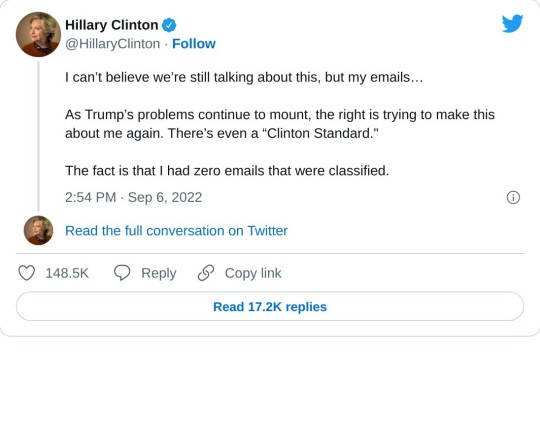

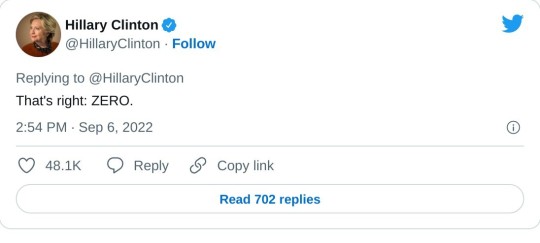


#us politics#2022#twitter#tweet#democrats#hillary clinton#butter emails#classified documents#top secret documents#2016#james comey#republicans#conservatives#republicans be like#conservatives be like#department of justice#fbi#fbi raid#donald trump#mar a lago
105 notes
·
View notes
Text
What i absolutely despise about the music industry nowadays is how artists must overpromote their new singles. I understand this is how they earn their living and are probably required to do so by their contracts + social media algorithms are shit, alright, so it's not a rant about the artists themselves, just the industry as a whole. You get flooded by posts/tweets/insta stories about the upcoming single almost every day for at least a month before; usually with the same 5-10s long sample, which you grow to hate even before you hear the rest of the song. Then the song is out, you're still harassed by posts about it. "Hey, we released a song, like, 3 hours ago, have you heard it??? Oh and the music video is out, so we're gonna show you glimpses of it in every configuration possible for another 2 weeks!! And here's 20 posts about the new single-related merch, by the way." It's just ONE song, leave me alone and come back when you have a whole album to offer!!
Which, of course, brings me to another thing i love about sleep token. Even if you learn they're gonna release a single, it's not from them directly and you learn it, like, a day before it drops. It's refreshing and makes social media experience a tiny bit less annoying in the world where you are constantly supposed to pre-save the new single NOW
#i'm with boomers on this one#i don't even know how pre-saving works lmao#(i don't use streaming services ok)#anyways!! i know they're still promoting their stuff but it's different when there's an overhyped song and a whole ass album to promote#and yeah they do promote their merch but it's always a merch drop out of nowhere and it's hillarious#you just get the 'follower x obtain' email and roll with it#god i hope they will be able to keep their socials like that for as long as they can#also it is worth mentioning i do not use tiktok so idk how annoying it was when the summoning got popular there#but like it wasn't coming from them directly and god knows tiktok is a place of no honour and once sth gets popular there you're fucked#sleep token
8 notes
·
View notes
Photo
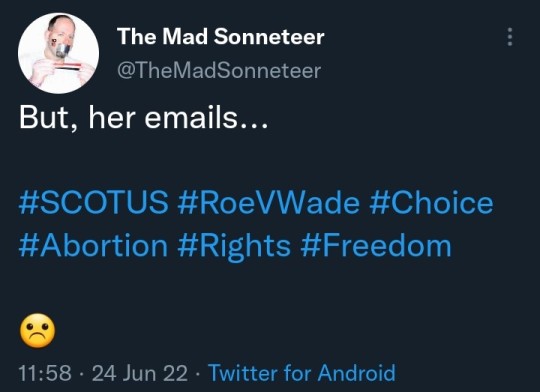
#SCOTUS#Supreme Court#Roe v Wade#abortion#choice#rights#freedom#Hillary Clinton#emails#The Mad Sonneteer#Bud Koenemund
82 notes
·
View notes
Photo
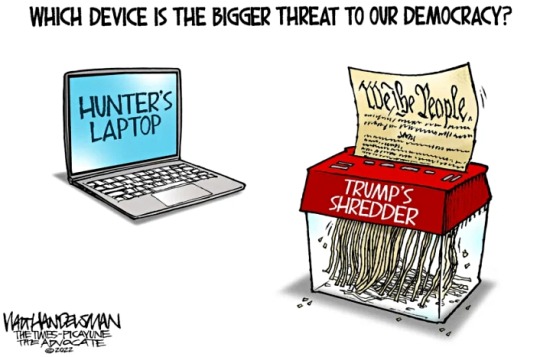
Hunter Biden’s laptop is the new Hillary Clinton email server of the House GOP.
They want to spend the next two years talking about it in the vain hope that voters will forget that their leader instigated an attempted coup which included a terrorist assault on the US Capitol, totally botched the federal response to the COVID-19 pandemic, hung out with Nazis, and alienated most of America’s allies while kissing up to Kim Jong-un, Vladimir Putin and other tyrants.

#hunter biden's laptop#house gop#gym jordan#donald trump#us constiturion#democracy#trump wants to terminate the constitution#trump 2024#trump scandals#trump for prison#election 2024#hunter biden's laptop is the updated hillary clinton email server for house republicans#walt handelsman
15 notes
·
View notes
Text
unexpected files being delivered to my dropbox are definitely a virus, right? bc the other option is that the notification email is a phishing attempt, but the sender address looks legit
#*eyeroll*#vanitas vanitatum et omnia vanitas#principal horn kept making political jokes- 'you finally found hillary's emails!' 'THAT's the proof that the election was rigged!'#me: yeah i'll be sure to call the associated press
3 notes
·
View notes
Text
Feeling nostalgic. I miss the “this is dog” meme.

It was a different time.
3 notes
·
View notes
Text
A day after the FBI conducted a search of former President Donald Trump’s Mar-a-Lago estate, Hillary Clinton responded on Tuesday with a tweet promoting merchandise emblazoned with the phrase “But Her Emails” — which has become the sardonic response among her supporters to Trump’s many scandals.
Clinton wrote that every hat or T-shirt sold benefits Onward Together, the political action committee she founded following her loss to Trump in the 2016 presidential election.
In a follow-up tweet, the former secretary of state said that the $30 hats quickly sold out but could be preordered for when they are back in stock.
90 notes
·
View notes
Text


15 notes
·
View notes
Photo

10 notes
·
View notes
